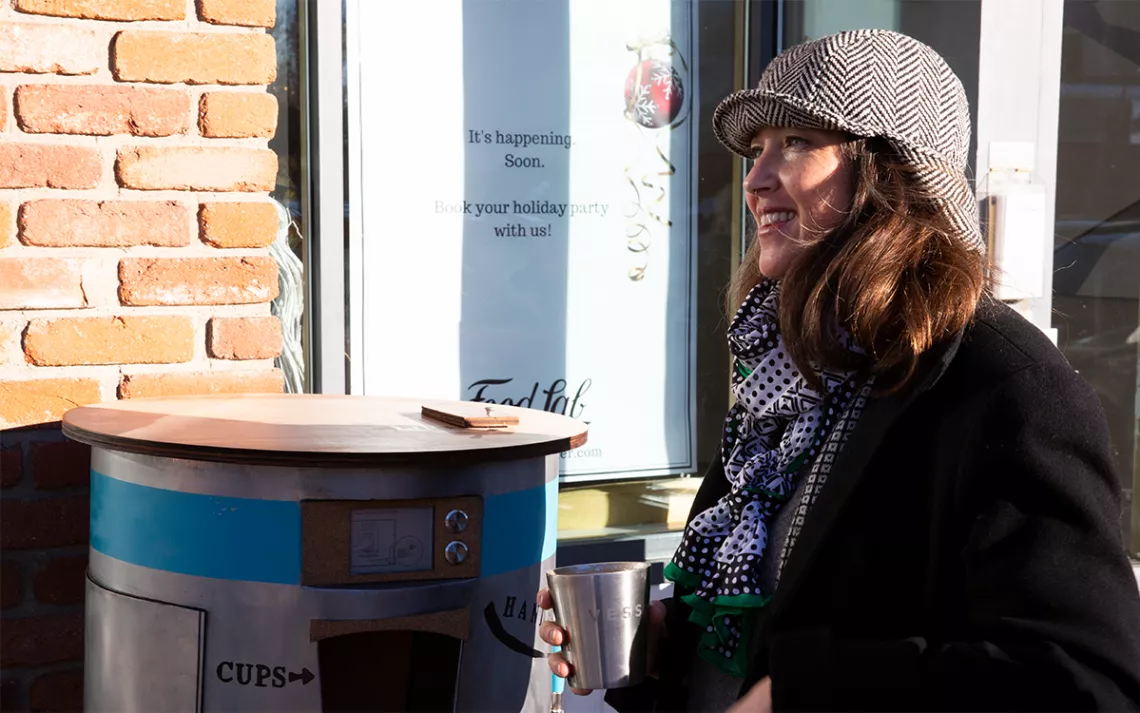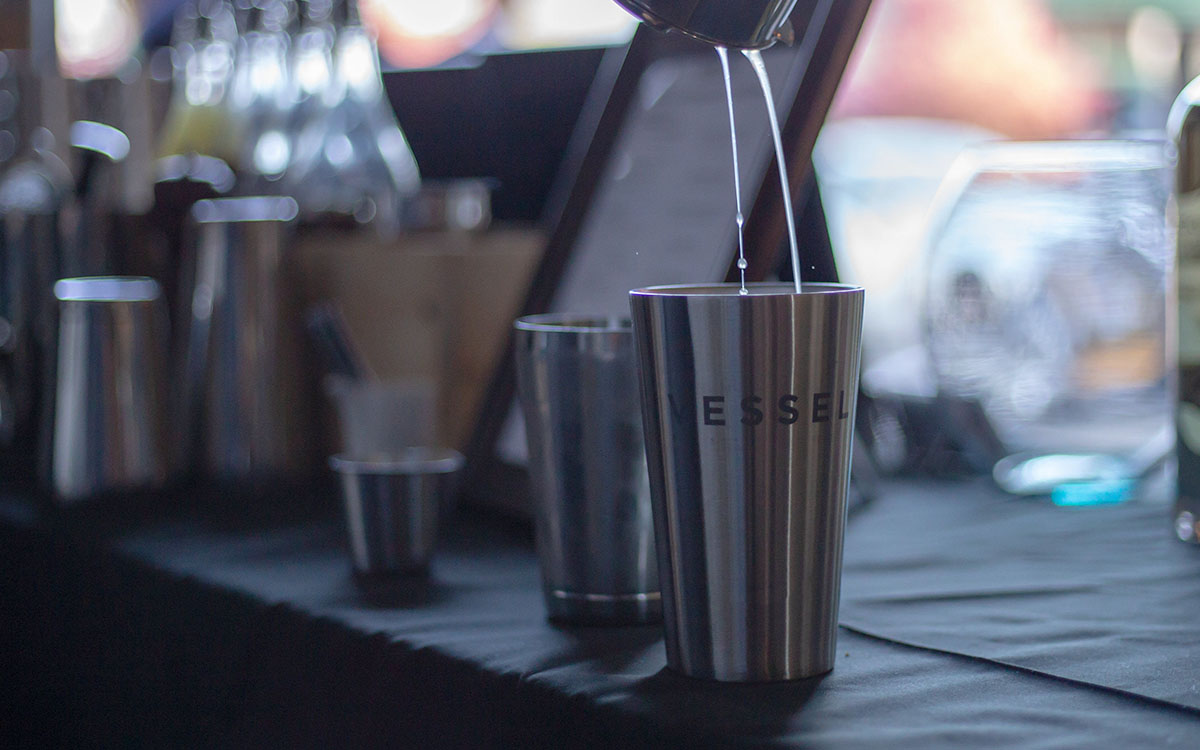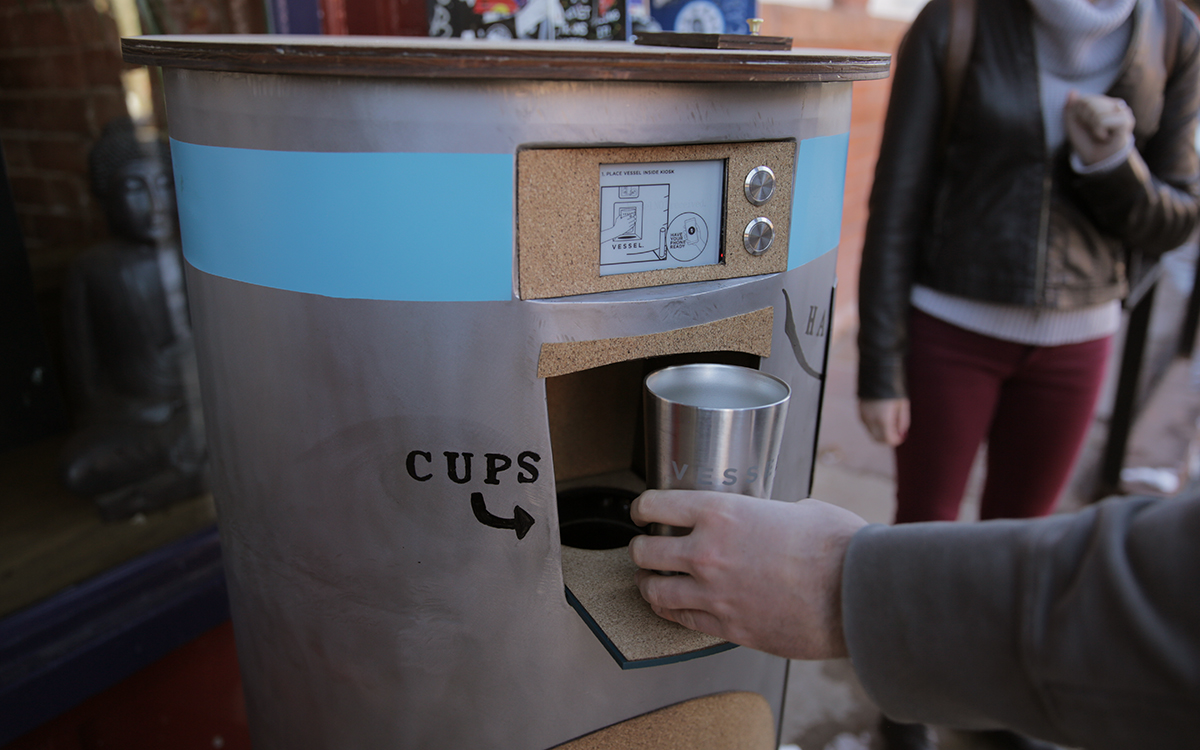Cup Sharing: The Reusable Revolution’s Latest Development
Inside Vessel Works’ new libation lending library

Vessel Works founder Dagny Tucker
|Photos courtesy of Vessel Works
Next time you grab a cup of coffee, why not share? That’s the strategy behind Vessel Works, a nonprofit start-up that aims to combine the convenience of a to-go cup with a convivial bike-share sensibility, in hopes of landing on an environment-friendly solution to the disposable-cup crisis.
 Each Vessel circulates like a library book. Customers register for the program online (providing their name and a credit card number in case the cup gets lost). Then they simply “check out” a double-wall-insulated, stainless-steel Vessel when they place their drink order at a participating cafe—currently, Vessels are circulating at seven cafes around Boulder, Colorado, and on the University of Colorado Boulder campus, with more on the way to other cities.
Each Vessel circulates like a library book. Customers register for the program online (providing their name and a credit card number in case the cup gets lost). Then they simply “check out” a double-wall-insulated, stainless-steel Vessel when they place their drink order at a participating cafe—currently, Vessels are circulating at seven cafes around Boulder, Colorado, and on the University of Colorado Boulder campus, with more on the way to other cities.
Once people finish slurping, they can return the cup at one of Vessel Works’ 24-hour outdoor kiosks within the next five days. Dirty cups are then collected from the kiosks by a pedi-cab service, which whisks the cups to be cleaned and sanitized at a health-department-certified facility. When they’re ready to go back out into circulation, the Vessels are wrapped in food-grade packaging and delivered to cafes by pedi-cab to be reused another day—wash, rinse, and repeat. Each cup is tech-enabled so inventory can be tracked in real-time. The entire program is free, but anyone who decides to keep the cup will be charged $15 following a couple of friendly reminders.
Vessel Works is the brainchild of founder and CEO Dagny Tucker, who brings an unconventional background—merging design know-how with a PhD in international peace conflict and development—to the overflowing single-use cup problem. “I spent a lot of time looking at violent conflict around the world and what drives it,” she says. “That led me to look at the use of resources, which are often a driver of conflict, and then to look at how businesses operate, and sustainability, and all of these intersections.” Over 20 years of study, Tucker came to an understanding that would galvanize her resolve to become an agent of change. “I realized there’s a really big disconnect between seemingly innocuous choices and their far-reaching impact.”
And what could be more innocuous than a simple coffee cup? Although it may seem tiny, it is in fact a 58-billion-paper-cups-dumped-in-US-landfills-per-year problem. Moreover, manufacturing that number of paper cups requires 20 million trees and 12 billion gallons of water. Factor in the 25 billion foam cups and tens of billions of single-use plastic cups consumers in the United States churn through each year and the astounding scale of the predicament becomes clear.
“The reality is that we can’t recycle paper cups because they have a plastic lining on the inside,” Tucker laments. But while some might look at those statistics and despair, Tucker recognized an opportunity for action. “I decided to come up with an intervention that would both solve the problem of single-use disposables and also allow me to communicate with people about the positive impacts they have by making a little change.”
And in this case, that little change takes the shape of a Vessel. Available in two sizes—12 and 16/18 ounces—the Vessels are stackable, hygienic, and 100 percent recyclable. “A lot of people would say, ‘Why don’t people bring their own cups?’” Tucker admits. “And I agree, it would be wonderful—but the reality is that people don’t.” She cites the statistics in Boulder, where Vessel is being launched after a test phase in New York. “In Boulder, less than 10 people a day will show up to an average coffee shop with their own cup,” Tucker says. “In New York City, what we found was that people don’t want to bother carrying one more thing.” The company’s research on commuters proved even more discouraging. “In car culture, it tends to be that people forget it, or they forget it for a couple of days, and then it gets gross,” she says.
“In terms of reusable solutions, there wasn’t anything else out there.” Tucker cites a couple of fledgling reusable cup initiatives in England and Australia. Munich, Germany, has been experimenting with a reusable heavy-duty plastic cup based on a deposit system, and Starbucks (responsible for 6 billion paper cups per year) has partnered with McDonald’s to launch the NextGen Cup Challenge tempting inventors with a $1 million prize to create a completely recyclable and/or compostable paper cup. So far, Tucker hasn’t seen anything that’s gone live or scaled up to any significant level.
So, just how sustainable is the Vessel compared to a paper cup? Doesn’t all that washing make an impact? “The Vessels are tested for 400-plus uses, and the LCA (life cycle assessment) plays out at 23 uses,” Tucker explains. “So, once we’ve used a Vessel 23 times, the LCA wins on all levels—materiality, energy, and water—over the paper cup.”
 The Vessel word is getting around, and other cities are showing an interest in learning more about the simple-yet-sophisticated cup-sharing strategy. “Many cities and universities have reached out to us directly, so we’re evaluating all those opportunities to decide who will be next,” Tucker explains, citing Austin, Texas, as a city whose representatives have asked to learn more about the Vessel reuse model. “The fastest sign-up rates come on campus,” Tucker says. “I think younger people don’t hesitate because, one, they get the idea of sustainability; and two, they don’t hesitate to use a tech-enabled service.” In other cafes throughout Boulder, Vessel use spans the age ranges. “It’s a totally new concept, and it takes people a few times to say, ‘Oh, aha! I got it!’ And then it’s very easy,” Tucker says. The library book analogy has proven very helpful in educating people on the Vessel approach. “We’ve also specifically worked with health departments to provide protocols on reusables, so it’s forging new paths in that way too.”
The Vessel word is getting around, and other cities are showing an interest in learning more about the simple-yet-sophisticated cup-sharing strategy. “Many cities and universities have reached out to us directly, so we’re evaluating all those opportunities to decide who will be next,” Tucker explains, citing Austin, Texas, as a city whose representatives have asked to learn more about the Vessel reuse model. “The fastest sign-up rates come on campus,” Tucker says. “I think younger people don’t hesitate because, one, they get the idea of sustainability; and two, they don’t hesitate to use a tech-enabled service.” In other cafes throughout Boulder, Vessel use spans the age ranges. “It’s a totally new concept, and it takes people a few times to say, ‘Oh, aha! I got it!’ And then it’s very easy,” Tucker says. The library book analogy has proven very helpful in educating people on the Vessel approach. “We’ve also specifically worked with health departments to provide protocols on reusables, so it’s forging new paths in that way too.”
Reception around Boulder has been overwhelmingly positive. “There’s not a day when somebody doesn’t come up and say, ‘This is so awesome; we’re so excited!’ or ‘Thank you for doing this!’” Tucker says with a laugh. “This is a beta launch, so we have some things we want to improve, but the overall response that we get back is just enthusiasm.”
Worldwide, plenty of creative minds are hard at work on a solution to the coffee-cup conundrum, and the people behind Vessel Works are optimistic. “If anything, we hope to continue to inspire behavior changes, and to start thinking about those choices all around,” Tucker says. “For people to really see that a sustainable future can be beautiful—and better.” As the Vessel Works mission statement proclaims: “The reusable revolution is coming!”
 The Magazine of The Sierra Club
The Magazine of The Sierra Club



